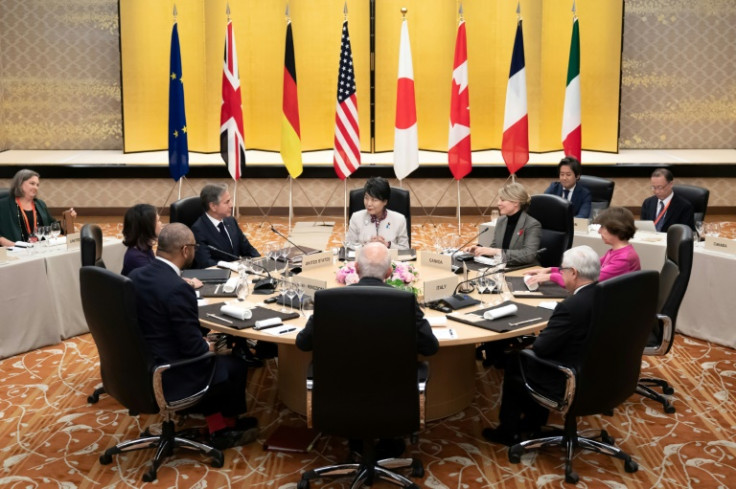G7 Seeks Common Line On Gaza, Vows 'Strong Support' For Ukraine

G7 foreign ministers sought Wednesday to hammer out a common line on the Israel-Hamas war while vowing there would be no let-up in their support for Ukraine in its war with Russia.
The ministers were expected to call in a joint statement to be issued later in Tokyo for "humanitarian pauses" in Gaza, while stopping short of urging a ceasefire.
US Secretary of State Antony Blinken, arriving for the talks from his latest whirlwind Middle East tour, called Tuesday for the G7 to speak "in one clear voice" on the conflict.
Japanese Foreign Minister Yoko Kamiwaka said late Tuesday that the G7 ministers "need to call on the relevant countries to take humanitarian pauses and ensure humanitarian access, which is a pre-condition for sufficient and continued humanitarian assistance".
A diplomatic source said after a working dinner the same day focusing on Gaza that there was "great unity that in view of the humanitarian emergency in Gaza, humanitarian care for the Palestinian civilian population needs to be urgently expanded".
The source added that there were "constructive exchanges" about humanitarian pauses, as well as the need for discussions among the G7 and other countries in the region about the future of Gaza and how to stop the conflict from spreading.
The Israeli military has relentlessly bombarded Gaza since October 7, when Hamas militants launched an attack that left 1,400 dead in Israel, most of them civilians, according to Israeli authorities.
The Hamas-run health ministry says the death toll in Gaza has surpassed 10,300 people.
Prime Minister Benjamin Netanyahu said Monday there would be no fuel delivered to Gaza and no ceasefire unless the more than 240 Israeli hostages seized by Hamas were freed.
He also said Israel would assume "overall security" in Gaza after the war ends while allowing for possible "tactical pauses" before then to free captives and deliver aid to the besieged territory of 2.4 million people.
However, Washington said Tuesday it opposed a new long-term occupation of Gaza by Israel.
"Our viewpoint is that Palestinians must be at the forefront of these decisions and Gaza is Palestinian land and it will remain Palestinian land," said State Department spokesman Vedant Patel.
"Generally speaking, we do not support the reoccupation of Gaza and neither does Israel."
While agreeing Palestinian leadership was part of the "route towards a sustainable, peaceful two-state solution," British foreign minister James Cleverly on Tuesday also conceded a military presence would remain after the fighting, at least temporarily.
"At some point after the immediate conflict and before the creation of civilian leadership, it is inevitable that the military forces on the ground would have to take over security control," he said.
On the Ukraine war, Japan said Wednesday after their talks that the G7 was "united" in their resolve to continue providing "strong support" to Kyiv and imposing "severe sanctions" on Russia.
Kamikawa added that "even as tensions increase in the Middle East, it is important for the G7 to be united in sending a clear message to the international community that our steadfast commitment to supporting Ukraine will never waver".
With the war there now in its 20th month and Ukraine's counteroffensive struggling to gain ground, President Volodymyr Zelensky has regularly met Western leaders to try to stave off fatigue over the conflict.
Ukraine's most senior military official, General Valery Zaluzhny, was quoted last week as saying the two sides had hit a "stalemate", an assessment rejected by both Zelensky and the Kremlin.
German Foreign Minister Annalena Baerbock said earlier that G7 countries were working on providing help to Ukraine as the country braced for a second full winter of Russian attacks on energy facilities.
Systematic strikes by Moscow's forces last year targeted Ukraine's energy grid, leaving thousands without heating or electricity in freezing temperatures for long periods.
"It is clear, particularly at this moment, that around the world some (parties) are watching very closely how we will continue to support Ukraine," Baerbock told reporters.
"We will do that with everything we are doing."
Ukrainian Foreign Minister Dmytro Kuleba was set to join the G7 meeting by video conference.
© Copyright AFP 2025. All rights reserved.





















